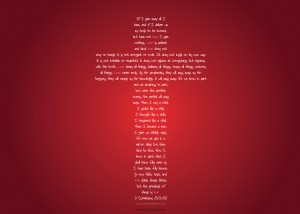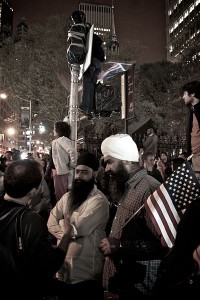Mark Sayers has a knack of articulating what many of us deep-down know to be true.
Here is my review of his latest book, Strange Days…
Faith and relevance in the 21st century
Mark Sayers has a knack of articulating what many of us deep-down know to be true.
Here is my review of his latest book, Strange Days…
Hey, Lord, well you made me like I am.
Can You heal this restlessness?
Will there be a void in my heart
When they carry me out to rest?
– John Mellencamp – Void In My Heart
In the last few years the financial institution, Credit Suisse, has ranked Australia, per capita, in the top three richest countries in the world. At the same time, loneliness, depression and anxiety are at epidemic levels, and the suicide rate is at a peak not seen in the last decade.
Our culture teaches us that life is found in the freedom to be yourself, which generally means without the distractions and interruptions of others, even our significant others. But while that excitement might last for a season, it ultimately leaves us unsatisfied. Then we try to fill the hole with the next experience, only to find that that doesn’t last either.
We try to fill our lives with externals. We try to make ourselves rich so we can live a life of leisure; we want to be entertained constantly; we are addicted to our devices to the point where we check them when we wake up in the middle of the night in case there might be something we are missing out on. Continue reading
 “It’s not about what you’re doing but what God is doing in you” – Mark Sayers
“It’s not about what you’re doing but what God is doing in you” – Mark Sayers
Even when it hurts like hell.
Sometimes we go through things in life which are painful beyond anything we’ve ever had to go through before. And sometimes we feel like we’ve just had enough. Recently I posted a very good article about the fallacy of believing that God doesn’t give us more than we can handle. A few more thoughts about this come to mind:
People are there. Rely on them. God is there. Trust in God as much as you are able. Hope is real. Our present sufferings are temporary.
 If ever we had a case of that in human history it is in these days of the world wide web. No wonder it has been coined the information superhighway. We have so much information, and knowledge beyond measure. But is it good for us? Has it made us a better society? Surely the internet has brought untold benefits to humankind. Witness the use of social media in the Arab spring, and how human rights abuses are brought to light so much more quickly these days. There are less places to hide for those who would perpetrate such hideous crimes.
If ever we had a case of that in human history it is in these days of the world wide web. No wonder it has been coined the information superhighway. We have so much information, and knowledge beyond measure. But is it good for us? Has it made us a better society? Surely the internet has brought untold benefits to humankind. Witness the use of social media in the Arab spring, and how human rights abuses are brought to light so much more quickly these days. There are less places to hide for those who would perpetrate such hideous crimes.
But what do we say about the value of the glut of information we now have literally at our fingertips? Alister McGrath, in his book, Surprised by Meaning, quotes the poet Edna St Vincent Millay who spoke of a “meteoric shower of facts” raining from the sky. Millay, McGrath says, points out that we are overwhelmed with information but we cannot make sense of the “shower of facts” with which we are bombarded. McGrath goes on to say, “confronted with a glut of information that we cannot process, we find ourselves living on the brink of incoherence and meaninglessness.” He then gives the clincher: “information is not the same as meaning, nor is knowledge identical with wisdom.” For an intellectually-minded person like me, that is something I need constant reminding of.
 Speaking to some family members on the weekend, one of them spoke about their brother who had just recovered from prostate cancer. We also talked about someone else in their 50s who had recently succumbed to breast cancer and how she left behind a husband and children who were traumatised by it all.
Speaking to some family members on the weekend, one of them spoke about their brother who had just recovered from prostate cancer. We also talked about someone else in their 50s who had recently succumbed to breast cancer and how she left behind a husband and children who were traumatised by it all.
The conversation turned then to how life catches up with all of us. We all go the same way in the end. From dust we arose and to dust we return. It made me think about what sort of person I want to be remembered as. It also made me think about what sort of society we want to have for those who come after us.
As I think about our comfort, complacency and apathy, particularly about how much we grumble in this country despite being the richest country in the world, I think of the movie The Hunger Games. In that story, people are so satiated that they have lost all sense of morality and sense of compassion for others. They happily go to the games and have no idea what is happening to the disadvantaged in their own city.
The same is true of us. The idea of leaving a legacy in our lives seems a distant memory, and not even a memory for most of us. We are so busy trying to be happy in our lives that very few of us think about what sort of world we want to leave our children. If asked, most people would say that of course they want to leave a better world for those who come next. But we don’t stop to ponder anymore. We have forgotten what it’s like to take time to stop and smell the roses.
Are we so consumed with pleasure that we have forgotten what gave us the good life in the first place? Do we really believe that there is any value in taking time to stop and think and ponder about life? Or do we blindly and unthinkingly accept the mantra that what really matters is the economy, that the key to having a good society is having a strong economy? I suspect most of us do when it all boils down to it.
Here is a great little clip from Mark Sayers on why many Christians, and almost everyone in the West, have become enslaved to our feelings. I lived like this for years. For me, the old ‘fact, faith, feelings’ train in a Christian tract that I saw about 30 years ago still holds true.
[vimeo http://vimeo.com/41128426 ]
Over the next 3 days I will be reflecting on the 11th anniversary of 9/11. The events of that terrible day reveal some fascinating insights into our Western contradictions, hope, happiness and what really matters in life. Today’s post is called ‘The Last Days of Mohamed Atta’ (Atta was of course one of the hijackers).
In his latest book, The Road Trip that Changed the World, Mark Sayers talks about the contradictions we all live with. He uses the very revealing example of the 9/11 hijackers and their exploits in the days before they slammed planes into icons of what they saw as Western decadence. Here is what Sayers says:
[vimeo http://vimeo.com/40927169 ]
The extraordinary actions of the hijackers highlights for me, not just the contradictions of our lives, but the confusion and deception we all buy into, whether or not we are aware of them (and mostly I don’t think we are aware).
All humans want to be happy. To quote an unlikely source – current Collingwood AFL coach Nathan Buckley – we all want to feel good. And our culture drums the message into us that a certain type of lifestyle will bring us the happiness we all crave. As M. Scott Peck said, we are people of the lie. In this case it is the lie that possessions will fill the void within.
In The Road Trip that Changed the World, Sayers goes on to talk about the consumer Christianity which has become so dominant in The US and in Australia. Relevant Magazine recently had an article questioning whether or not we would still follow Jesus if your life didn’t get any better. Here is a penetrating quote from the article:
“If we’re not careful, we inadvertently imply that if one only focuses enough on Jesus, one’s circumstances will get better, and better, and oh-so infinitely better.” This is the subtle promise of much Christianity today. If it is not straight out prosperity teaching, where the idea is that God has a plan for you to be fabulously rich and beautiful, then it is something more subtle where the idea is that God will ‘bless’ you when you serve him. And ‘blessing’ implies that things will go well for you.”
“There’s a void in my heart that I can’t seem to fill. I do charity work when I believe in a cause, but my soul it bothers me still.
– John Mellencamp, Void in My Heart
In the heart of every human being is a God-shaped hole. A saying that has been mostly attributed to Augustine is that humanity was made to worship God, and we are restless until we do.
 If we are able to grasp this truth, we will see more clearly that everything we do in life is done in search of meaning. Despite the decline of faith in Australia and the media coverage of the ‘New Atheism’ over the years, the search for meaning never goes away, even if it might be drowned out by our lifestyle of endless consumption.
If we are able to grasp this truth, we will see more clearly that everything we do in life is done in search of meaning. Despite the decline of faith in Australia and the media coverage of the ‘New Atheism’ over the years, the search for meaning never goes away, even if it might be drowned out by our lifestyle of endless consumption.
One of the signs of this search is the rapid increase in recent decades in the tide of addiction. When the alcoholic takes another drink, thinking this one will be different; when the drug addict injects again honestly believing this time it will give him what he needs; or when the sex addict settles on what he believes is finally the perfect porn clip, they are all actually searching for something deeper. They are searching for God.
 In a postmodern world, and a post-Christian Australia, traditional Christian apologetics don’t get very far with a lot of people. 25 years ago when I was still a fairly new believer, books like Josh McDowell’s Evidence That Demands a Verdict were wonderful in helping to strengthen my faith. Today though, they don’t do a whole lot. I still like to read apologetics, although I tend to gravitate towards the likes of N.T. Wright and others these days. I just find I don’t have much of an interest in works like McDowell’s. Many people would though, and if people are assisted in their faith and growth toward God, then I think that is wonderful.
In a postmodern world, and a post-Christian Australia, traditional Christian apologetics don’t get very far with a lot of people. 25 years ago when I was still a fairly new believer, books like Josh McDowell’s Evidence That Demands a Verdict were wonderful in helping to strengthen my faith. Today though, they don’t do a whole lot. I still like to read apologetics, although I tend to gravitate towards the likes of N.T. Wright and others these days. I just find I don’t have much of an interest in works like McDowell’s. Many people would though, and if people are assisted in their faith and growth toward God, then I think that is wonderful.
I suspect though that more people like to see genuine expressions of Christian faith from believers who live their faith in all they do, people who want nothing more than to be Christlike. There is nothing like the life of Christ shining through his followers to get people thinking. This is always the best advertisement for God. Love is the greatest apologetic. One of the great insights I heard once was that Jesus had no need of an apologetic. People flocked to him; the common people heard him gladly. Jesus’ life was his apologetic, and he calls us to the same.
Back in those days in the mid to late 1980s, I was taught a number of things about Christian faith, from the Four Spiritual Laws to evidences for Jesus’ resurrection, to learning how to turn conversations around to the things of God. Today I believe that such thinking is quite dangerous and short-changes the gospel of Jesus. The Gospel is actually much bigger than that, as well as being much more accessible to the average Aussie in the street. Mark Sayers tells the story of when he was speaking once and explaining the story of God’s new creation through Jesus, how Jesus came to inaugurate the kingdom of God on earth and how Christian faith is not about going to heaven when we die. After Mark’s talk, a friend of his came to him and told how she was sitting next to a person who wasn’t a believer, and this person said “why hasn’t anyone told me about this before?” When Mark expressed the Gospel as it really is, it touched something deep inside this person.
Christian faith is ultimately about a story, and people love stories. They always have. That’s why Jesus told so many. He never actually defined the kingdom of God; in describing it, he always began with “it is like…” When we tell stories of the great things God is doing in the world, people listen. When we tell them of what Eden Parris calls rumours of hope, or what Philip Yancey calls rumours of another world, they begin to prick up their ears and listen.
 As opinions over the death of Osama Bin Laden go viral over the world-wide web, I have been both impressed and saddened by the responses I have seen. Like most people of civilised mind, I am glad that Bin Laden can no longer terrorise the innocent victims of his murderous, monstrous and unjust actions. The man was a monster and deserved to be brought to justice in the most powerful way possible. It’s a pity that he was not.
As opinions over the death of Osama Bin Laden go viral over the world-wide web, I have been both impressed and saddened by the responses I have seen. Like most people of civilised mind, I am glad that Bin Laden can no longer terrorise the innocent victims of his murderous, monstrous and unjust actions. The man was a monster and deserved to be brought to justice in the most powerful way possible. It’s a pity that he was not.
This is where President Obama is wrong. Justice has not been done in the killing of this terrorist. The words of America’s greatest prophet, Martin Luther King, echo through the ages: “peace is not the absence of conflict; it is the presence of justice.” Because justice has not been done in the killing of Bin Laden, peace will not be the result. As surely as night follows day, the forces of al-Qaeda will be planning revenge attacks, and the cycle will continue. And where will it end? In this day when we have the capacity to destroy the only planet we have, King’s words cry out to us again: “it is no longer a choice between violence and non-violence in this world; it’s non-violence or non-existence.” Rejoicing in the death of Bin Laden reduces us to the level of his brutal actions.
The thing about the word of the prophet is that it is timeless. King spoke those words more than a generation ago but they ring true today more than ever. Violence begets violence and hate begets hate. It is a never-ending cycle.
The fact is that we simply must get over the myth that non-violence is somehow weak and that might is powerful. Myriad examples through the centuries simply disprove this idea. Sojourners has an excellent collection of resources which expose the myth of redemptive violence and illustrate the power of non-violence through actual examples of it over many years. I have also blogged about this myself, particularly about the misunderstandings over what Jesus was really referring to when he said to turn the other cheek.
It is love and non-violence that will triumph in the end, not the weakness and impotence of violence. Miroslav Volf touches on this in his reflection on the Christian Century website, where he has included a quote from a young Christian leader from the Middle East – a view forged in a majority-Muslim country:
A huge opportunity now–after the death of bin Laden–is for Americans to intentionally free themselves fully from the domain of fear and those who manipulate it for their own agendas. Politicians will be looking for the next “enemy” to continue to distract you from being truly the “land of the free.” You are not free until you eliminate all your fear. Love drives out fear.
As Daniel Sturgeon points out, “Osama bin Laden’s mistake was to believe that violence could bring righteousness. He acted in line with this misbelief and the consequences for the whole world have been catastrophic.” And those who believe justice has been done by taking him out fall into the same trap. This is where the response of some of the tabloid media in Australia has been shockingly predictable. Headlines like the Herald-Sun’s ‘Unarmed – just like his victims’ promote the same hatred that Bin Laden did. It was Gandhi who said long ago that this old law of an eye for an eye leaves everybody blind.
Another of the better articles (in my opinion) I read during the week was from Gideon Boas and Pascale Chifflet in The Age, in which they pointed out the pertinent fact that saying that killing Bin Laden was a good thing because he is scum that deserves nothing less belies the very notion of ‘us’ being the good guys (“who believe in the value of life, the rule of law and fundamental human rights”) and ‘them’ (“murderous hateful souls “) being the bad guys. What is the difference between us and them when we engage in the very same actions that they do? This is not justice; it is revenge, and the two are as far apart as east is from west.
One of the points that I have not heard from those on the Christian Left (I hate that term but I can’t think of anything better to describe such a group at the moment) is that of sparing our thoughts and prayers for the victims of 9/11 and for our brothers and sisters in the US in general. The events of this week will bring all the nightmares of that terrible day flooding back for them. I can’t imagine the feelings they must be going through. Many would be feeling huge relief, many others would be convinced that justice has in fact been done and nothing anyone says would convince them otherwise, whilst others – and I suspect the majority – will be thankful but ever mindful that even the death of the mastermind of those terrible attacks cannot bring back their dear ones. We must spare our thoughts and prayers for them this week as well. While I cannot agree with those who rejoice at Bin Laden’s death, I have to ask myself how I would respond if I were in their shoes.
So, opinions abound, as they will for a long time to come. But perhaps the best sociological reflection of this event comes from Mark Sayers, who explores the responses of both the Christian Left and the Christian Right, among many other groups (Here I will add that the reason I hate the terms ‘Christian Left’ and ‘Christian Right’ is that they label people. At different times I could find myself in either camp. The only label I want to be stuck with is ‘follower of Jesus’. Having said that, I see where Mark is coming from to make his point). In the end Mark says that he does not celebrate Bin Laden’s death, nor does he mourn his passing. Most of all he waits for the return of him who is both perfect love and justice. Wonderful words. In the end that is our hope. We have the promise of a day when there will be no more need to justify killings in the name of God or anyone else, when death and violence will have passed away forever. Until then we mourn and as we do we are blessed by the Man of Sorrows who mourns with the victims of injustice everywhere.
© 2025 Soul Thoughts
Theme by Anders Noren — Up ↑